#johann drew
Text

here's gerry moshing for my he's a METALHEAD not a goth propaganda
(lyrics in the background are from dead end residents by cattle decapitation)
#this is going to be me when i see cattle decap on wednesday#the references i used for this. well. lets just say i have several videos of me flailing about in my pjs and leather coat on my phone now#i drew this while watching the entire avatar ages memories concert livestream#the hair is referenced from johannes eckerström in that#early avatar johannes looks like gerry and later avatar johannes looks like if nikola orsinov was a vocalist in a metal band#drawing motion is so incredibly difficult guys this is tricky#gerard keay#gerry keay#tma#the magnus archives#tmagp#the magnus protocol
176 notes
·
View notes
Text

Dante wants to go home
#johann is waiting for him#who taught noé how to do that?#vnc#vnc art#noé archiviste#vanitas#vanitas no carte#vnc dante#Vanoé#the case study of vanitas#vanitas x noe#i drew this in one sitting#fanart
695 notes
·
View notes
Text
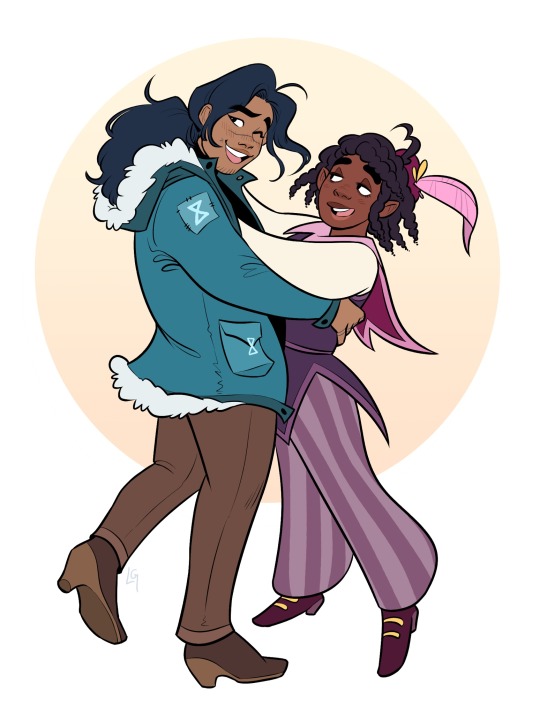
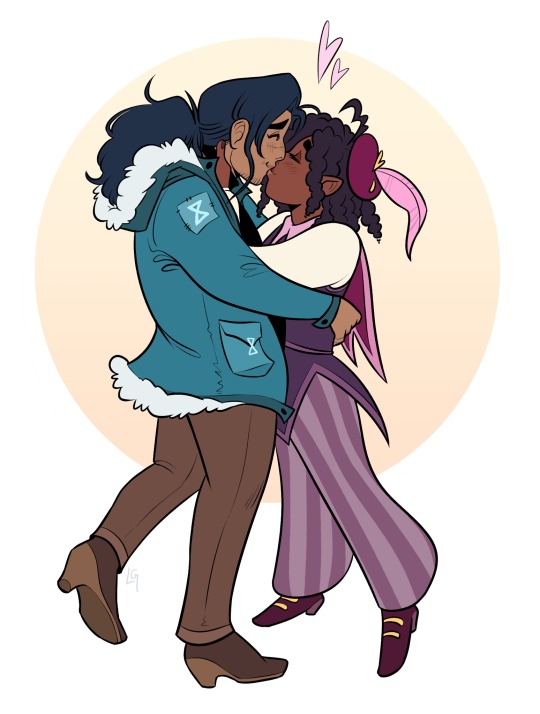
ID: Two digital drawings of Avi and Johann over a beige background. In the first version, Johann wraps his arms around Avi’s neck; Avi’s hands are around Johann’s back. They look off to the left, with open smiles and amused looks. In the second version, they are in the same pose, but kissing each other with closed eyes and small hearts above them. Avi is a tall, Inuk human man with brown skin and shoulder-length, dark hair tied into a ponytail. Avi has traditional tunniit, one long line across his nose and three smaller lines under the corner of his lips. He’s wearing a blue Bureau parka with white fluffy trim, brown pants and boots. Johann is a shorter, dark-skinned, Black half-elf man with shoulder-length, curly black hair. He’s wearing a feathered cap, a small, pink cape over a dark purple vest, striped purple flare pants, and dark dress shoes. End ID.
gay love and smooches are REAL for johavi!!
thank you so much to @mcnuggyy for drawing them so gorgeously for me!! please go check them out 💖
#taz#taz balance#taz avi#taz johann#johavi#ADMIRE HOW THEY DREW JOHANNS CLOTHES. HOW THEY DREW MY INUK AVI‼️#god I’m so insane over this
260 notes
·
View notes
Text
the shiver 🦈🦈🦈
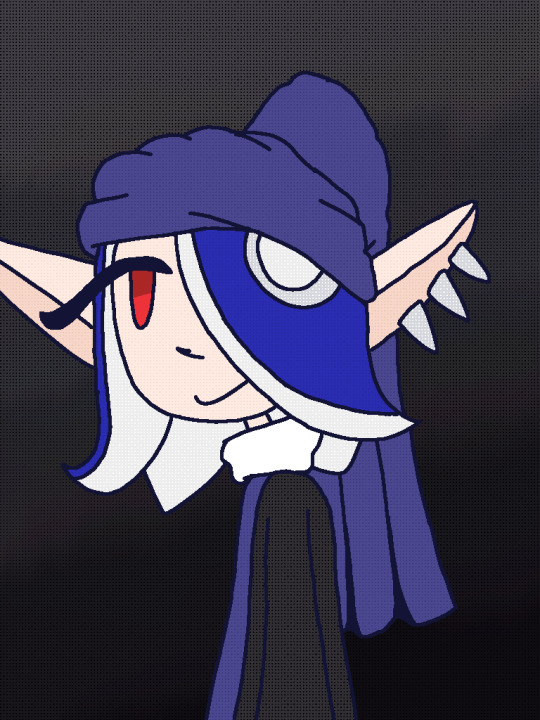
#digital art#art#artists on tumblr#splat3#splatoon#splatoon 3#shiver#shiver splatoon#fanart#drew this 4 art class#its pretty much a redraw of the painting#girl with a pearl earring by johannes vermeer
28 notes
·
View notes
Text

rule #34
#the caption links to the song called rule 34 by fish in a birdcage btw.#not anything nefarious /j#illustration#my art#oc#original character#johann tyto#lushifel sol-mcallister#idk how to tag this bc technically nothing is happening they're just chilling etc#suggestive#i drew an ikea bed i am not drawing an actual background etc
7 notes
·
View notes
Photo

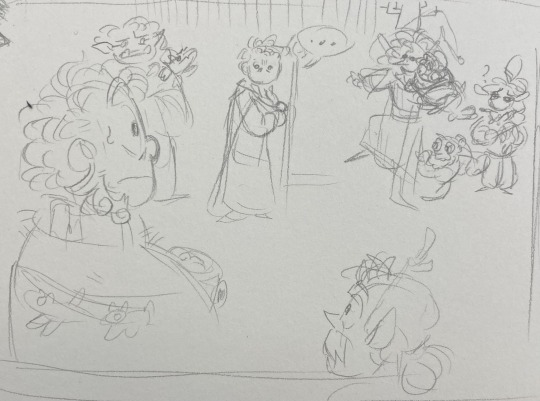
god dont you hate it when you yell at your necklace in front of your employees at their holiday party
#ent’s art#taz balance#taz taako#taz magnus#taz merle#taz davenport#taz killian#taz carey#ok cmon ent two more characters#taz angus#taz johann#i drew this a lil while ago RFUHIEDJKS
131 notes
·
View notes
Text
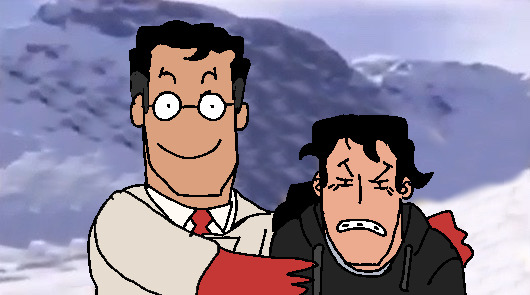
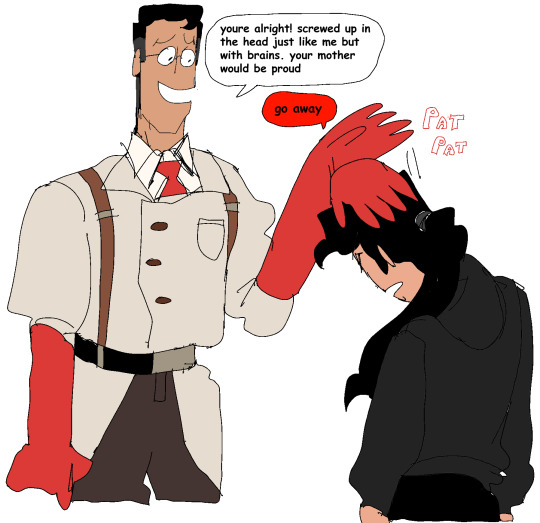
who the hell gave this guy 2 b a dad
#tf2 medic#tf2 oc#medic#johanne#oopie#oh yeah. twas me. sorry guys caption cancelled#i drew the 1st 1 b4 but doing it again bcuz i fucking love that image soooooooooooooo much
33 notes
·
View notes
Text
@hcze asked “ you have my full attention. you always do." Drew to Johanne, tis true tho :P
flirty memes >:3c
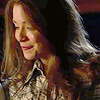
“ Appreciative as that is— ” The woman eyed him with stormy blues, amusement and thanks danced on her expression. “ —Again with the flattery, Drew? You have been calling me pretty many times now since we first met. Is there something you’re trying to get at, min venn? ” It was all in good fun, of course. Not many knew how much Johanne liked to light-heartedly tease, and much less were on the receiving end of it.
#hcze#alva johanne frost#[ tr: my friend ]#[ she vibes with it lol 🤙🏼🤙🏼]#[ jo: will tomato drew make another appearance perhaps? ]
6 notes
·
View notes
Text
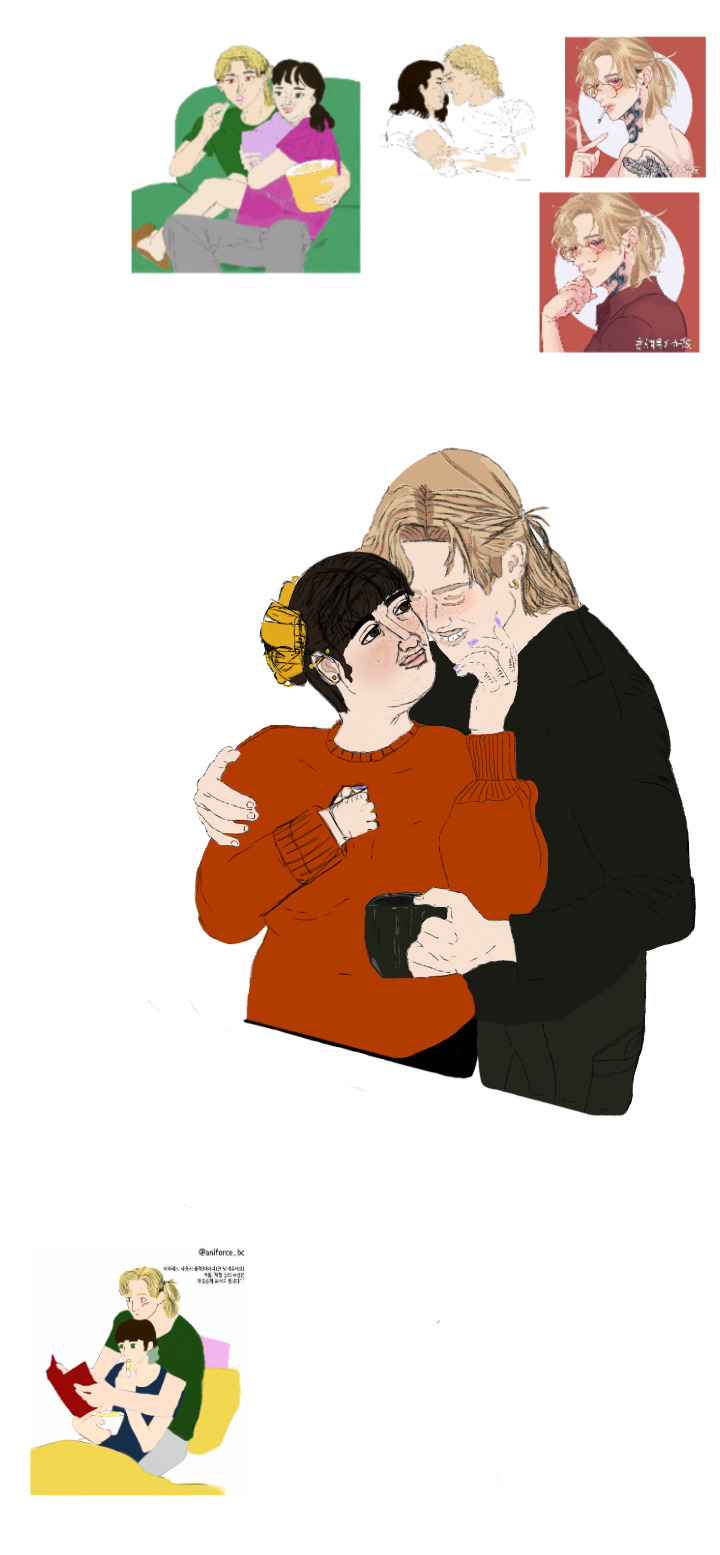
Hello folks I finished my drawing of Johann and Me today. I hope you like it.
25.11.2023
Bye Tokkis 🐰🐇
#happyday#lol#i drew this#illustration#digital art#my art#original character#oc#johann shepherd#dark obsession#vampire oc#couple
1 note
·
View note
Text
altrxisme:
‘ So I have been told many a time no matter where I go. ’ Mouth curved into a side grin, the hand that held her whiskey rose to a slight tip until she realized that she had already drank it all. Her brows furrowed for a moment, wanting to flick herself in the face for that brief moment of forgetfulness. ‘ That boy is quite the walking hazard for someone with such a pretty face. ’ The Norwegian sighed as she lowered the glass onto the table, sliding it onto the wood a little farther away from her as a reminder to get another whiskey later.
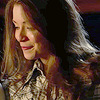
‘ But yes, I am one of those that care very much for him. ’
She chuckled with a shake of her head, amusement flitting about her expression as she raised a brow at Drew resting his chin on his palm. Johanne huffed quietly, cheeks somewhat aching with the smile that remained longer than usual. The man proved to be quite a pleasant conversation partner; usually a difficult find for the younger woman. ‘ I started when I was around seven or so, my father and I moved often so it was more of a hobby until we settled in Pennsylvania. ’
What got her interested in the art though? ‘ Hrm… To be honest, I cannot remember one singular reason…’ There was one memorable instance, however, that made her take dancing more seriously. ‘ — I believe it was when my instructor told me I had a very talkative face when I danced. A hilarious statement given how I was back then.’
Drew laughed briefly, ❛ A walking hazard, well now that I relate to when I was his age. I also have the scars to prove it so ❜ Another chuckle came right after, a shake of his head as he dipped right back onto sipping his whiskey.
Siblings relationship, family gatherings, the thought along brought him a smile once again. He could tell both Jackson and Johanne must have been joined at the hip when growing up maybe, it was a reassuring thought for the sad evening. Her company had been enough to cheer it up slightly.
❛ Seven? Oh wow...❜ he muttered in awe, then continued to listen attentively. ❛ I can’t imagine how you were back then for it to be a hilarious statement though. Shy kid? ❜ he pried with a little nudge of his elbow and a soft chuckle. ❛ I mean, they do say that shy kids lose their introversion when in synch with art. ❜
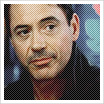
❛ But that’s amazing, that you followed the path and you like it. I bet you’ve traveled a lot while dancing, have you? ❜
#↪ Drew#Johanne ( Drew )#altrxisme Johanne | Drew ( 001 )#int ( altrxisme )#altrxisme ( 001 )#Opus || : sing us a song ─ ( main )#No 5 || : hello world; how’ve you been? ─ ( arc )
0 notes
Text
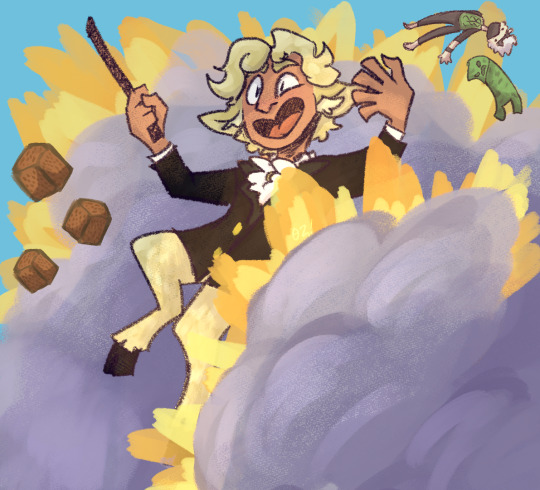
Zedaph Fanart from the episode he used creepers as a musical instrument
Fun fact, I drew this at like- 3am immediately after seeing the episode
#hermitcraft#hermitcraft fanart#myart#zedaph#zedaph fanart#creeper? aww man#Etho#ethoslab#ethoslab fanart#Spotify#artists on tumblr
271 notes
·
View notes
Text
Naoki Urasawa's manga "Monster" Interview;
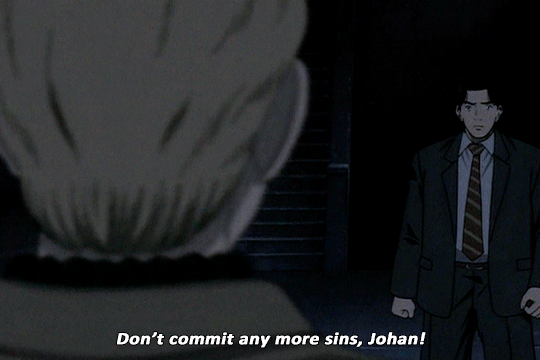
Naoki Urasawa is one of the most successful manga artists in Japan, having not only been awarded the most important prizes in Japan, but also in Germany. He celebrated his international breakthrough with the thriller series "Monster", which he drew in the 90s. It's about a Japanese neurosurgeon in Düsseldorf who saves the life of a boy and gives up his career to do it - actually he should have operated on the mayor instead of the boy - and then gets into real trouble because he is involved in a series of serial murders and a conspiracy device.
Andrea Heinze : How did you come up with the idea for the series?
Naoki Urasawa: The drama “Monster” was created because I really liked the novel “Frankenstein”. That really interested me and I thought about whether I could bring the story into today. The second aspect was that at that time in the USA there was this film with Harrison Ford, “The Fugitive”. It was about a doctor whose wife was killed and I really liked it. And then I thought, I have to do something that involves a doctor who is being chased and has to solve a mystery. And then I was interested in “Frankenstein,” this old Gothic landscape, and I wanted to bring the two together somehow. And then we somehow came across Germany.
Blonde boy as a contrast to evil Germany
I heard that people saying Johan was inspired by Hannibal and other psychopathic characters etc but it never make sense to me. (Maybe some characteristic sides makes sense but generally no, he is different). It makes sense that Monster is inspired by Frankenstein story because Johan is portrayed as more like someone who became the way he is because of his past. He is the monster created by the real monster. (Mostly its Franz Bonaparta who stole his and many others name, biggest sin a person can do). Its really combined between two stories because Tenma wasnt/isnt wrong to save Johan.
Heinze: And what does Germany have to do with it?
Urasawa: I wanted to do something dark. And I don't want to say that Germany is the root of all evil. But if you look at the Second World War - and this is present in Japan, also because Japan was an ally of Germany at the time - there were a lot of dark stories in Germany and also in Japan. A lot has been clarified. But some things don't. I also came up with this beautiful, blonde, blue-eyed boy as a character. I think that's a good contrast to contrast with this dark, bad thing. And the more you delve into history, the more clear it becomes that the roots of the conflicts lie in the Second World War. If you add all of that up, the manga could only take place in Germany.
I am glad that real life stories was brought up but its really sad that this actually happenned somewhere.
Heinze: How did you research the story for “Monster”?
Urasawa : I watched a lot of documentaries. In the 1990s there were also reports of neo-Nazi attacks on houses where Turks lived. I've seen things like that and they've also found their way into my story. I made up the rest. For example, the boy, Johann. He is raised in a children's home where many human experiments take place. And shortly before I finished my work "Monster," there was a documentary on Japanese television about the end of the Nazi era, and it also reported on a camp in which blonde, blue-eyed young people were herded together and essentially had to undergo elite training . And this boy who was depicted there was also called Johannes. I was then asked if I had known all of this before - but that wasn't true, it was all in my imagination.
A person becomes a monster
This is insane....chills. Its so ironic that a lot of people remember Johan's character as some evil psychopath but not only he isnt written that way in story but also, his origin is literally coming from actual victim, a child. Intentional or unconciously or maybe coincidence but still, wow.
Heinze: How is it that Prague also became the setting for the story?
Urasawa: Because everything that was east of Germany, all the Eastern European countries, was not even known in Japan in the 1990s. It's completely different today, but back then people hardly knew everything that lay east of Germany. While on the other hand, Germany and everything further west was already developed for tourism. And Eastern Europe had never been featured in the manga until then. It also fascinated and really attracted me as an illustrator. If you go to Germany or France, it is much brighter in the evenings. But if you go further east, in my case it was Prague, it was much darker on the streets in the evenings in the mid-90s. And I wanted to explore this darkness, this night, for myself.
No wonder story feels so real, with both its characters and places.
Heinze: What does the manga “Monster” have to do with Mary Shelly’s novel “Frankenstein”?
Urasawa : Frankenstein is about a scientist who created a monster, and it's also about human responsibility. There are certainly things that humans are allowed to do and that they perhaps shouldn't be able to do. These thoughts can certainly be taken further, and that's what I did in the "Monster" series. It's about the Japanese doctor who saved a boy, and later the boy becomes a monster, a murderer. And then the doctor asks himself whether he is not responsible for the fact that this boy has become a murderer. This is a different conflict than in "Frankenstein", but the question of responsibility for one's own actions is also an issue in "Monster".
Dostoyevsky novel using the means of manga
Though, story is inspired by Frankeinstein, Tenma is clearly right to save kid's life. He isnt the 'evil' doctor who is responsible for the monster. He is the real doctor who saves this boy from destruction at the end.
Heinze : For me, this doctor is an ideal example of the good in people. He even saves this boy against the wishes of the clinic management, who would much rather use their best surgeon to operate on the mayor.
Urasawa: Every good person has places somewhere in their hearts that are perhaps not so good, and it was the same with Doctor Hämmer - in the hospital there were also some disagreements with the management, where he also thought: "Preferably I would like it if everyone were dead." And later Johann also tells him: "I have fulfilled what you wished for." Then the idea came to him that he had also caused all of this and was to blame for it. And I wanted to show in my work that there is something good and something bad in every person, and that is just human nature. Also, what I didn't mention: There is the classic manga "Astroboy" by Osamu Tezuka in Japan. There is a scientist whose son died and he then creates a robot that looks like his son and that also has feelings. But somehow he says: "You are not my son." At some point he neglects this robot. This scientist is basically Doctor Tenma. So “Frankenstein” and “Astro Boy” are the two sides that belong closely together. I especially consider the artist Tezuka with his classic “Astro Boy” to be my roots.
Here's the real message of Monster, that noone is just a monster and every person has monster in them and that story, Tenma is being parallels with father who neglects his son...I wonder is it him realizing that he was never supposed to kill Johan (the son), he was right to save him, trying to kill him is the neglect/him failing to understand him and end up saving him. Maybe i am reaching but its makes more sense that way. Btw i love how Tenma visits Johan even at the end. Despite everything, they really give that father-son energy.
Heinze: Osamu Tezuka is considered the founder of modern manga, what do you like about him?
Urasawa: It's hard to say in one word. Maybe you can describe it like this: The manga were initially comics for children. But Tezuka did it differently, he practically wrote something like a Dostoyevsky novel, but using the means of manga. Something much deeper, and ultimately it's not about justice winning, but it goes even deeper, practically conveying the feeling that even winning can bring with it something sad and empty. This is something deeper. And he was able to convey that in the beginning of the manga.
Statements made by our conversation partners reflect their own views. Deutschlandfunk does not adopt statements made by its interlocutors in interviews and discussions.
Its really deep story.
This is the source of this interview, i really wanted to make comment/analyze about it.
#naoki urasawa's monster meta#monster naoki urasawa#monster meta#johan liebert#tenma kenzo#interview#naoki urasawa#monster#frankenstein#crossover meta
42 notes
·
View notes
Text
april end innovade update (and possibly one of if not final update)
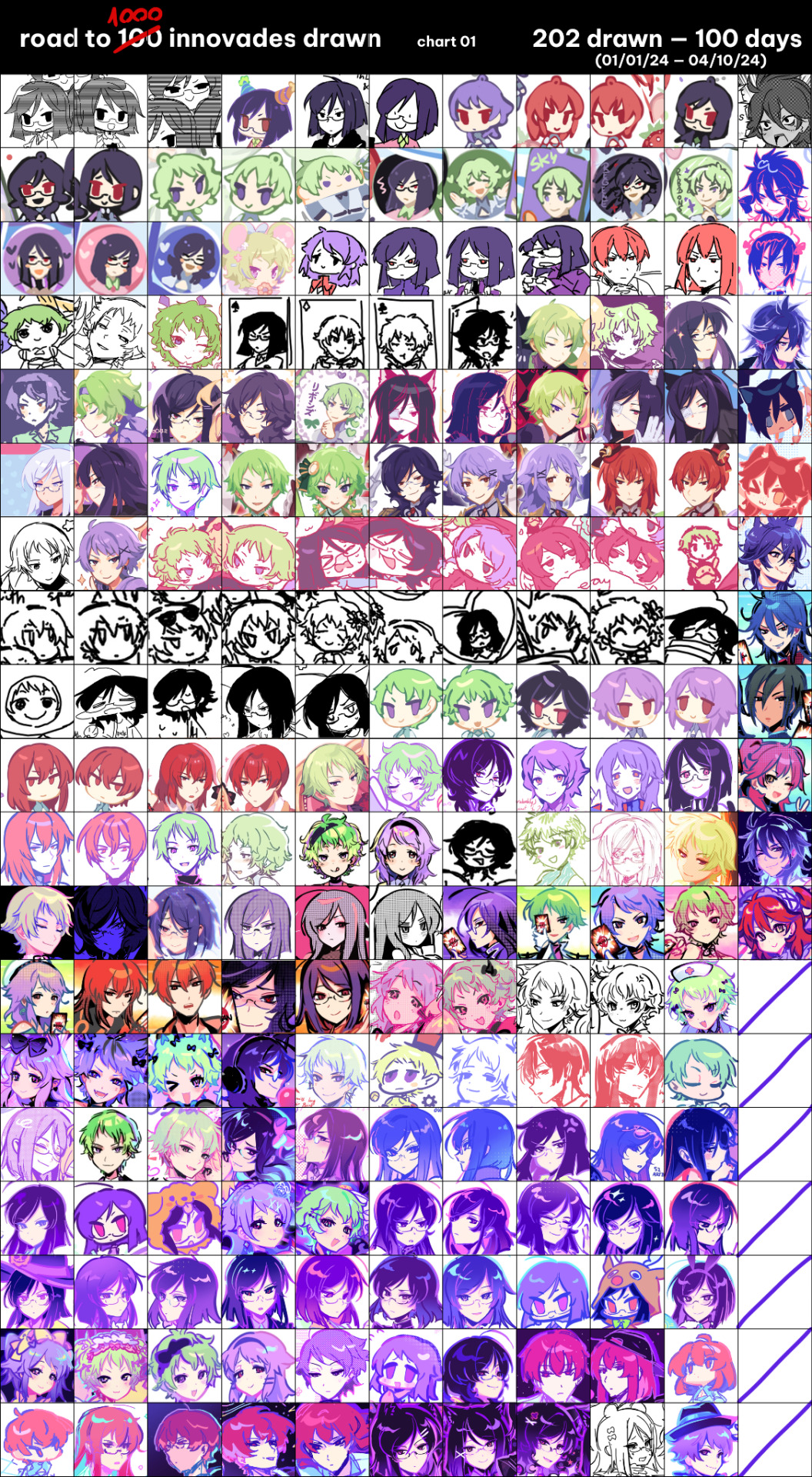

Statistics:
this was the first month in which i've only drawn one out of all trinities (michael only) (-)
the draw rate has raised since last month's 2.04 to 2.16/day (+)
first time ive drawn a piece including all innovades i tend to usually draw (+)
first time inclusion of 'others' (with the miku innovade designs) (+)
still only drew least drawn innovade a single time (sky) (-)
total drawn - 249
per innovade:
tieria - 59
laetitia - 15
regene - 23
revive - 19
bring - 18
divine - 17
anew - 14
sky - 6
hiling - 33
ribbons - 41
trinities
michael - 9
johann - 3
nena - 3
other - 2
—
ending note / long ramble about the whole situation
its been a long while huh 😭 exactly 4 months. minus a day ! on a year with a longer february as well, nonetheless. its been fun, but i may stop drawing them now; not to say natsume has utterly obliterated my love for innovades inside of my brain (though i thought of announcing it this way with a funny headline like BREAKING NEWS ! natsume has murdered the entire species of innovades in cold blood. we are sorry for the inconvenience), but also as of late it did sort of become a bother to draw them; mostly because of the keeping track of it as well and because i did not want the draw rate etc to drop. i did get to 1/4th of my goal.. minus one ! im not saying i will NEVER be drawing them ever again, but i doubt ill be keeping track of it anymore — alongside that, i do not think i will be drawing them almost at all anymore either (now, for a while. but they may still appear here and there from time to time.. as all my past fandoms do), so if you were only here for them and not me & my works, feel free to unfollow. i will still be up to have talks about them ! but i just wont devote such a high amount of time and effort to them anymore. it is hard to say ive been slowly falling out of love with them, and mayhaps even harder to say im falling in love again with natsume 😭 and EXACTLY a year later after i last stopped drawing him too... which is crazy .
i feel like besides this, it was also becoming apparent that drawing them has become a chore to me ; i was not feeling up to drawing highly detailed pieces with them anymore that id spend time on. i was not happy with the results on many of them either. and things like the page of every single tieria outfit, despite it used to be a thing i was once hyped about doing... back in january when i just got here, it no longer was that way. yes, i pushed through with it, but it took me a very long time and i kind of disliked going back to it, which is why it even took me that long 😭 and was moreso just done to keep up the numbers of innovades drawn ; for myself, for others.
i cannot lie about the fact it did make me happy i was giving to such a small fandom and brightening other peoples days, and this is a big flaw i have that i tend to put others above myself, but this has become much too big of a bother to me to keep on doing it. i still love them ! not as much, but i still do, especially ribbons. there is nothing wrong with them, i just do not wish to continue essentially wasting so much of my time drawing things i do not enjoy drawing, unless i am to see it finished and thats all the joy i get out of it.
as for the requests with the innovades, i am unsure if i am to do them anymore except for a singular one that ive also not received thru an ask but dm, purely because i am actually hyped about it 😭 and that may be the extent of which you will be seeing anymore 00 content from me.
im sorry if ive let anyone down & thank you for following me through this journey ; i hope to see you again :)
24 notes
·
View notes
Text

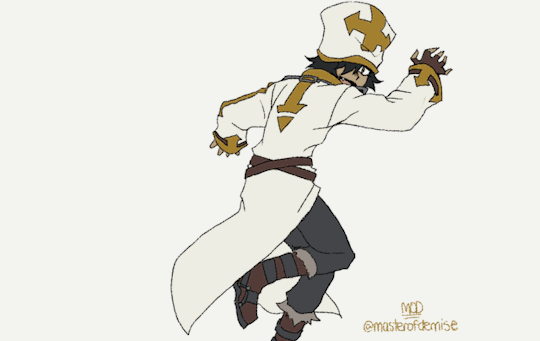
Around seven hours of my life just for a second worth of animation </3 /j
I wanted to try reanimating one of the scenes of Johannes in Fury where he's mocking the Beylin Temple since I really like his movement in it. I basically drew everything frame by frame as close to the original as possible since this is mostly a study more than anything else. The only thing that might be noticeably different is how I drew some of his face and hair, doing something more akin to my style there. This is especially so since some of the frames in the original were uh, funny.
Despite how long it took to do the flat coloring on Procreate, I am quite happy with how this turned out and might go and play around with doing something similar but for Pluto instead. I'll see about whether or not I'll post any of those though.
View below for some of the still frames and the original frames I worked with:
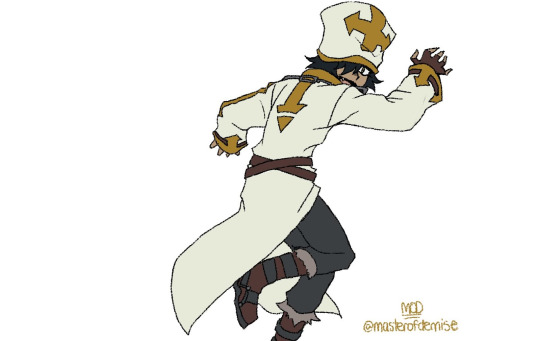
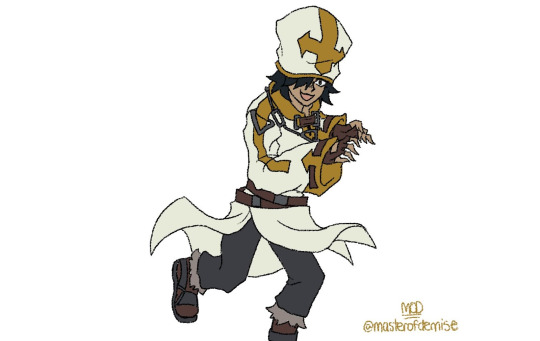
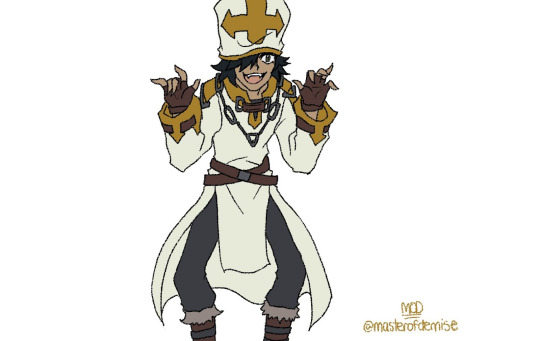
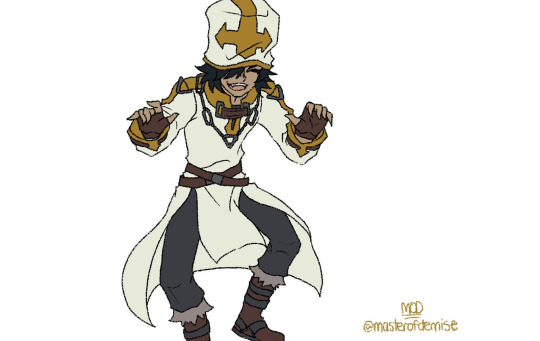
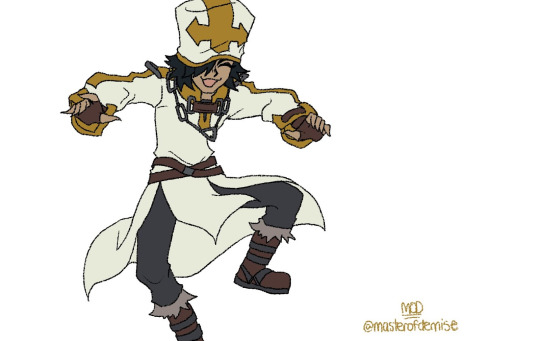
Here are some of my favourite stills.
Below are some of the original frames I basically tried to replicate.
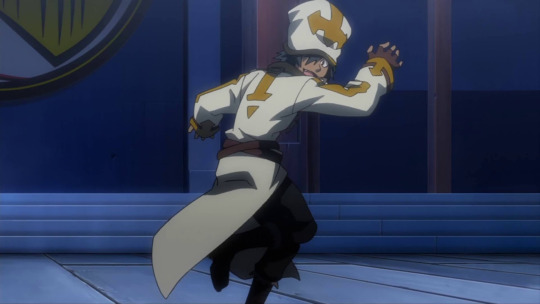

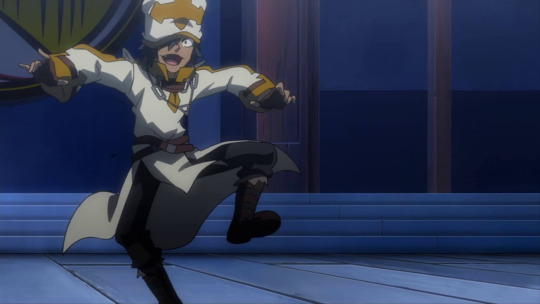
#metal fight beyblade#beyblade#beyblade metal saga#beyblade metal fury#johannes beyblade#beyblade fanart#beyblade animation#masterofdemise art
88 notes
·
View notes
Text

cigarettes & feelings (and the two memes i made for 4/20 under the cut because i drew the actual illustration yesterday and then realized i had the perfect opportunity to post it today)


#happy 420 it actually just turned 4/21 here sadly#NOT quite on time#illustration#my art#oc#original character#lushifel sol-mcallister#johann tyto#cigarette#drugs#(under the cut)#((but in like a meme way))#also drew that 3 weed smoking girlfriends meme and went 'actually i'm not putting effort into this' halfway through
3 notes
·
View notes
Text
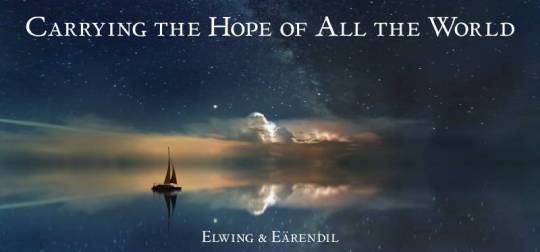
Fandom: The Silmarillion
Summary: Elwing arrives on Vingilot, bearing news of the Third Kinslaying. Earendil and his sailors must make a choice.
Length: 7.9k
AN: My contribution for @sindarweek day 3 "Legendary Deeds"!
AO3 | Pillowfort | SWG
Photo credit to Johannes Plenio on Unsplash.
_____________________________________________________
The bird had been approaching for an hour. It was not unusual for lost or weary seabirds to catch a ride on the ship, and large seabirds—such as this albatross—were the sort they usually saw so far out to sea. Eärendil could see even at a distance it was flagging; he hoped it made it to the ship. It looked too injured or exhausted to continue far the way it was going. He kept an eye on it as he went about his daily chores and directed his men about theirs.
To Eärendil’s relief, within the hour, the bird was descending unsteadily towards the deck, and it was in worse shape than Eärendil had thought. It crash-landed on the main deck, skidding across the slick wood, sailors dodging out of its path, until it finally came to a halt, breast heaving, wings outstretched.
A few sailors shouted and Eärendil hurried from the quarter deck to the panting bird.
“Give it space!” he called to the other sailors, making them back away. He made his approach slowly, so as not to panic it, but it was too exhausted to respond, lying limp and damp with spume on the deck. There was foam about the beak and its eyes darted wildly around, unseeing and panicked. “Poor thing,” he murmured, easing down onto his knees as he drew nearer. “Safe now, you are,” he crooned, reaching out to touch it on the back. When the bird did not flinch away, Eärendil cautiously gathered it up, aware that those powerful wings could give him a nasty knock on the head if the bird objected to being handled. “We’ll see you looked after,” he informed the albatross, which required two arms to carry, as he brought it belowdecks.
He saw the bird given some water and a few of their fish which had started to go off (he decided the albatross might object to slightly odiferous fish less than the sailors) and set it up in his cabin for the time being. It took up most of the bed, and Eärendil was loath to move it from where it had settled, so he resigned himself to a night in his desk chair.
“Fret not,” he said, lighting up his lamp to make notes on the happenings of the day in the captain’s log. Sometimes, the birds stayed with them until they were nearly at shore once again, hunting in the water and returning to roost on the ship. “Here you have safe haven. The hardest part of your journey is over, little friend.”
***
Eärendil hadn’t really intended to sleep much—not much good was to be had in the desk chair, and he worried about waking to a panicked albatross in his relatively cramped quarters. Better to be attentive to the bird and make sure he got it above deck as it started coming to again. Yet he must have dozed off after his watch shift, for he awoke abruptly in alarm, realizing, but the cabin was still quiet, the lap of the waves against the hull of the ship the only noise—and the breathing of his companion.
Sensing, perhaps, something amiss, Eärendil turned the lamp up and lifted it from the desk to peer at the bed, where the albatross was gone—and in its place, his own lady wife lay, wan and ill at rest even in her sleep.
“Shock” did not begin to cover it.
For a moment, Eärendil was caught in a loop, rapidly turning back to the desk, then to the bed, and once more to the desk, unable to decide if it was better to let Elwing rest or rouse her immediately and find out what—gently—the devil was going on here.
She was prone and naked across the bed, her normally silky black hair a stiff tangle, fragrant with sea spray, twitching and murmuring in her sleep. That itself was not unusual—Elwing had often slept poorly, bedeviled with insomnia and restless dreams that left her as weary as when she had gone down. He could always tell just on seeing her face in the morning if it had been a bad night.
It was the light that drew his attention to her hand, clutched into a fist—and inside, what could only be the Silmaril, aglow in its delicate silver necklace.
In the end, he decided answers on something of this magnitude could not wait. He set the lamp on the corner shelf beside the bed and shook her bare shoulder.
“Elwing.” He spoke in a hushed whisper, which made no sense when he considered, for he was trying to wake her, so he firmed his voice a little and said again, “Elwing!” It took a few more moments to dredge her from sleep and then she jerked upright with a shuddering gasp that wracked her body and set her weary muscles atremble. Her eyes resumed the frantic darting of the afternoon before and her breast began to rise and fall rapidly.
“Elwing,” Eärendil said firmly, grasping her wrist. “Elwing, beloved, how is it you are here? What ails you?”
Fighting against the panting jag which gripped her, Elwing managed at last to gasp: “The Feanorians! The Feanorians! They came!” A whole-body shiver went through her and her jaw clenched so tightly the muscle was like a knot at the corner of her jaw. Her dark gaze whipped over to pin Eärendil to the floor. “The Havens are lost!” Her voice rose to a hysterical wail. “Sirion is lost!”
And then she swooned, and said no more.
***
Trying to explain to his crew that the albatross was his wife was not as difficult as Eärendil had expected, but that was a concern for him to ponder another time. They drew down the sails at once, bringing the boat to near a stop as they could, after he had relayed the news about the Havens at Sirion. Everyone wanted more details—Arnaud threw up over the side of the boat when Eärendil told them the Feanorians had set upon the town—but Eärendil tried to give Elwing more time, telling them he could not wake her, that she was too worn out from the journey to bring her message.
The mood on the ship had shifted jarringly and irreversibly. No one spoke of anything but Sirion and Eärendil caught crew members hovering at the edges of his vision, clearly keen to ask if he would wake Elwing now.
No matter how Eärendil felt the knife’s edge of need to know about their children, he would have allowed Elwing more time to rest and recover before plying her with questions, but the anxiety of the crew was overpowering, and after some hours, he went below to wake her again and have the tale of her coming.
When he roused her, she knew he had come for answers; he could read it in the storm cloud on her face. He passed her the drink and the hardtack biscuits he had brought from the galley; she wolfed down both barely pausing for breath, and then he asked again what had happened.
“For the Silmaril they came,” Elwing rasped. Her oval-shaped face was drawn still, and Eärendil could see she needed more food and drink, but he found himself held there as if under spell.
“Yet you have it,” he said, nodding to where it sat beneath his thin pillow.
“I have it,” said Elwing bitterly. She swallowed hard several times, her hands trembling, her eyes flickering about the cabin. He had given her a tunic and trousers to wear, which fit poorly, tight in some places, loose in others.
Then, without warning, she hurled the wooden cup across the room where it hit the wall with such force Eärendil had no doubt it would have shattered if it had been glass. Elwing’s breathing had not changed at all; there was no expression on her face, but her eyes had gone hard in a way he had not seen for many years.
“For the Silmaril they came,” she repeated. She breathed in deeply, composing herself to speak of things and not of feelings. “Maedhros the Red wrote to me,” she said, venom pulsing through her voice. “He wrote after you had left, so to me so to inform me he knew I had in my possession something which belonged to his family. How exquisite his prose, beloved! How pacifying, how coaxing, how amiable! How he desired friendship with us, how he regretted the infighting among the Elves, how admirably we had grown up the Havens! How well we were doing for our small age.” Her hand curled into a fist on her lap. “And in each, how he reminded me what he had done to my mother and father. How he reminded me that I am mortal, as my father was.” Elwing’s breathing came with forced steadiness, like a sailor holding a line in a storm gale. “He wrote several times since your departure, each letter more insistent and less amiable than the last. I summoned the council.
“I passed around the letters of Maedhros Red, and I told them a decision need be made.” She flexed her fingers, wadded up her borrowed tunic in her hand, then released it. “In the end, the vote was unanimous,” she said. “We would not surrender Lúthien’s Silmaril to the Feanorians under such threats.” Again, she seemed to remind herself to breathe. “I wrote back to him, telling him I could not make such a decision while the Lord of the Havens was at sea, that they would need wait until you had returned to port. I thought…I thought I could buy us time. When you came back, we would gather the council again and discuss a final decision on the matter.”
She was shivering.
“They did not wait.”
Elwing was once more attempting to marshal her thoughts, but Eärendil could see her breathing speeding up, could see how she was trying to keep herself calm. She sensed the question that was coming and did not want to answer, and that knowledge dropped a cold rock into Eärendil’s stomach. There seemed to be a faint greenish tinge to her face.
“Elwing,” he said.
“No!” she cried, pushing past him as she rose from the bed to pace to the other side of the cabin as a trapped animal.
“Elrond and Elros,” Eärendil pleaded.
Elwing gave a cry of pain and sank to her knees, pressing the heel of her hand against her ribs, just below her left breast. More than ever she fought against the feelings roiling in her body which would have rendered her speechless.
“Gone,” she grit out. “Gone, gone, gone.”
Eärendil said nothing; he could say nothing; he sat heavily against the planks of the floor and looked at her.
“Babies, my babies,” she whispered to herself, rubbing that tender place over her ribs. “Eleven months I carried them; I fed them from my own body; I taught them to speak, to walk, to learn…” He thought she would say more then, but she only screamed, falling forward until her forehead touched the floor. “They took them,” she howled, clawing at the floorboards. “They took them! My mother! My father! My brothers! My home! My babies!” She loosed another agonized scream, a sound that must have been heard across the ship, louder than any Man or Elf should’ve been able to be. “My babies,” she sobbed.
The acute awareness of his own helplessness bowled Eärendil over: he had failed again in his quest to reach the far shores of Aman and find his parents, and bring help for Middle-earth; and he had been gone when his sons learned to walk and gone when they were taken by the monsters of Elwing’s childhood, figures that had stalked her nightmares as long as he had known her, since she was not waist high on Lady Idril; and what could he say to her now? What stitches could he put in this wound?
If he could only hold her in his arms and let it all have been another of her miserable dreams!
When she sat up, it was sudden, and she whipped her attention back to Eärendil, her bloodshot eyes aflame with wrath.
“What regrets, Lord Maedhros wrote to me to say, the Feanorians had about what had happened in Doriath,” she said. “What regrets! Never did he mention Eluréd and Elurín by name. He knew the weaknesses of his argument; how keenly he avoided them! Ah, but he did mention his own dead brothers! What regrets, he wrote. What mistakes had been made, he wrote. How he grieved the loss of his kin—such kin as would have twisted my grandmother’s finger into a wedding band regardless of her will!” In that moment, Eärendil could picture Elwing doing as her foremother had done and stripping the skin off her enemy to wear herself. “Now he has left me with the hope only that they gave my sons the mercy of the blade that they denied my brothers,” she said, and the bitterness in her voice could’ve endured for ten thousand years.
But Eärendil had seized upon a single word.
“Hope?” he echoed.
“Aye, hope! Though it is worth little where Feanorians are concerned.” Eärendil, unglued from his place, scrambled over to her, putting his hands on her knees.
“Elwing, Elwing, Elwing, beloved,” he said breathlessly. “Saw you the deaths of our sons?”
“Saw!” she exclaimed. “I need not have seen it! What else you imagine they might do with our children, scions of Elu Thingol and Fingolfin both?”
“But it is not assured,” Eärendil stressed.
“Of course it is!” Elwing snarled, pulling away from him, rising to her feet to pace. “I saw them put a blade to the throats of my children; need I have seen the blood? One may simply know the nature of a thing! They are dead, Eärendil, dead!”
Eärendil would not believe it. He could not believe it until he saw those tiny bodies for himself, or heard from one who had. But he could see that it would do no good to argue now; Elwing was distraught and he would do her no service trying to dissuade her of this certainty now. He would simply hold out hope that somehow, some way, she was mistaken on this. There was a chance.
“How did it happen?” he asked quietly. Breathing deeply, Elwing seated herself on the edge of his berth, her back rigid.
“It was just after nightfall when they came upon us,” she said calmly, reigning herself in to give him the information he craved. “Two of their lords we slew, though not Maedhros, but our forces were overwhelmed. When I saw…when I saw we could not win, I thought to draw them out from the town, give the others more time to flee…” Her throat tight, she swallowed again, then said: “To draw them away from the boys…the Silmaril I used to lure them away; to the cliffs they pursued me, but my guard was slain, and so it was I alone there with the Nauglamir and I am no swordswoman to vie against the sons of Fëanor…I knew not they had the children already.” She lowered her head and Eärendil moved to sit beside her, but he did not touch her; he knew she would not wish it. “In my hand I held it…and Maedhros and Maglor—with what hunger they looked upon that jewel!—when they had cornered me there, displayed our children, that I would know they were captive…
“Said Maedhros: ‘Cut their throats.’” Eärendil went tense despite the knowledge that Elwing had not seen the blood flow; she trembled, but spoke on. “And Maglor put them to the blade, but before he made the cut, Maedhros stayed his hand. So there they stood, six years old, a sword against their necks, and Maedhros asked again for the Silmaril.”
“They were crying,” Elwing whispered. “I could not hear their voices, but I saw that they wept, and reached out for me…I was so afraid they would try to run to me, that the Feanorians would slay them for it.” Eärendil’s stomach was a knot; Elwing’s hands were shaking against her legs. “If I had done differently…There might have been left to me some other option…if I had seen sooner that we would lose…if I had known they already had the children…” Eärendil could only imagine how Elwing had tortured herself with these thoughts on her journey over sea. He touched her shoulder, and while she did not lean into the touch, neither did she pull away.
“One cannot see the end of all paths at the start, nor even in the middle,” said Eärendil. For several long moments they were quiet, before Eärendil drew in his breath to speak, and Elwing interrupted at once:
“No,” she said. “Nothing would have changed were you there. They would have only slain you as well.” Now tears swam in her eyes, but did not fall. “I am glad you were away,” she whispered, her voice thick. “You should not have had to see…to smell…to hear…”
“All the same, I should have been,” said Eärendil wretchedly, whose memories of the sack of Gondolin were distant, but remained black as night in his recollection. Long had he been relieved that the passage of time dimmed their clarity from his childhood, but now he was anguished that Elwing alone should have such sharp memories of a city under siege.
“I have not even a shoe,” said Elwing, turning her palms upwards, her voice cracking as she looked down at her empty hands. “Not a hair clasp. Not one of those little wooden ducks your father—” She broke off, her voice growing too unsteady to speak, and now Eärendil gathered her into his arms, his throat too tight for words, and for a long time, they sat and ached for their children, for Elrond and Elros.
***
The crew wanted for their own news, and Elwing did not forget her duties as a leader of her people. When she had had another drink and rested briefly from her explanation, she permitted the crew to enter a few at a time. Each would describe to her their loved ones or their homes, and Elwing would share what, if anything, she knew of what had become of them. Sometimes, it was nothing. Others, she could report only what she had seen of them at the start of the assault. A few, she could conclusively report dead or destroyed.
But for most, there was a question mark, almost certain to be answered with an end, but while the possibility of life existed, the anguish endured.
“We have to turn back.” This was the general sentiment among the sailors. A handful, however, suggested it might still be dangerous. Was it not possible the Feanorians were waiting for Elwing’s return? Might they not be slain even as they drew near to shore?
Elwing remained below in the cabin, resting, and in the evening, Eärendil stood along the ship’s rail and looked out towards the setting sun. A cluster of sailors was behind him on the deck, still debating their next action.
“Danger!” one of the Men exclaimed. “And so? My sister was there! She may be there still!”
“Aye, and my parents,” said another. “Shall I speak over their graves that I might have saved them had I not been so concerned with my own skin?”
“Had your parents any sense, I doubt they would wish you to run yourself down on a Feanorian blade for their sakes,” someone else said with a poor attempt to control the snappish anxiety in their voice.
“What would we do there anyway!” cried a fourth. “We are sailors, not soldiers! The Feanorians would cut through us like grass!” The sky glowed a delicate, vibrant orange, one of Eärendil’s favorite times of day, but all he could see then was the fires burning in the Havens as Elwing had described them.
“We must try,” argued the first.
“Aye!”
“Aye!”
“To what end?” Eärendil interposed. The knot of sailors turned to look at him. He drew his attention from the horizon and looked at them. “To what end?” he repeated.
“For our homes!” said one of them, looking a little unsure about whether this was a trick question.
“For our families,” said another.
“To teach them a lesson!” offered up one.
“And then what?” Eärendil looked at them a long moment, then back at the orange sky. “If we drove the Feanorians off, what then?” He drummed his fingers against the ship rail. “There are no great Elven kingdoms left to stand against Morgoth. We would undoubtedly have to face the Feanorians again, at some point. Indeed, Morgoth made need never fully extend his hand—the peoples of Middle-earth may destroy themselves in his shadow.”
“Then what?” said one of the sailors. “We do nothing? We let them win?”
“They have not won,” Eärendil pointed out.
“And what good is that to us?” cried someone else. “Their loss cannot bring back our home!”
“Our homes shall never be safe so long as Morgoth reigns in Middle-earth!” Eärendil said, coming at last to what he realized was the core of his sentiment. “There can be only pockets of peace, brief interludes between bursts of violence…we are losing this war, do you see? We have been losing all this time! It has come so slowly we saw it not, but the end will come, and likely sooner than we think.”
He stepped away from the railing.
“Does any of you truly believe we can defeat Morgoth?” The sailors shuffled uneasily.
“What was our goal, when we set sail?” he asked instead.
“To reach the Blessed Realm.”
“To what purpose?”
“To obtain help from the powers there.”
“Believe you this is no longer necessary?” he asked. Silence was his answer.
“You want us to walk away from our families,” one Elf said softly. It was not an accusation so much as a statement. “What if they still live?”
“Then they are in danger which we cannot do more than temporarily abate at best,” said Eärendil. He let out a quiet exhale. “We will make a decision soon. Let none feel restrained from sharing their thoughts. This is a position we would hope never to be in, yet here we are. We will make of it what we can.” As he turned and made for the steps below, he wished dearly for the guidance and advice of his mother. She had survived many difficult decisions—surely she would have an idea of what he was meant to do here! Even father’s steadfast optimism would have been welcome.
He had meant to go down and raise this consideration with Elwing, but when he arrived in his cabin, she was asleep again, and he saw no cause to wake her. Rather, himself weary of a night with little sleep, he climbed into the berth with her and pressed tight to one another in the cramped quarters, they took a brief rest.
It wasn’t until hours later that night he was able to catch her alone—as alone as two people could be on a ship of Vingilot’s size—on the main deck. She was leaning against the railing on her forearms, her fine black hair loose in the wind, the light of the half-moon making her face look pale. From her fingers, dangling loosely out over the black water, was the Silmaril.
Eärendil came to lean against the railing beside her. The quiet voices of another conversation floated down from somewhere up on the main mast, far enough to be garbled if Eärendil wasn’t trying to listen in.
“We thought it was protecting us from Morgoth,” said Elwing, an inward-facing bitterness heavy in her voice. “We forgot there was other evil in the world.” Her fingers twisted in the chain, then let it hang loose again.
“All of that, for this,” Eärendil murmured, looking at it. The jewel seemed brighter than ever. In the past, Eärendil would’ve said it seemed to glow—now, out at sea under the open sky, there seemed to be no question it was emitting its own light, and seemed to shine somehow even more beautifully than before.
“I wish I could have destroyed it.” There was a shifting in Elwing’s fingers that made Eärendil’s hand twitch to reach out and close her grip more tightly around the chain.
“Elwing,” he said then, “how did you come to be here?” This was a gap in her story that had never cleared up, and while it perhaps was less important than the overall gist, it still troubled him.
“Lord Ulmo saw fit to intervene on my behalf,” she said, “though I did not ask it of him.”
“He turned you into the albatross?”
“Mhm.” She made a quiet noise of confirmation. “I think he may have broken something,” she said quietly. “Something that was meant to feel. I am only empty, now. Perhaps he left something behind at Sirion.”
Eärendil had known Elwing’s anger and grief and resentment and mourning, but this was different—this was something new, something deeper. Despair, or something near it, and it made him shiver inwardly. He shifted closer to her, so that his shoulder pressed against hers.
“I do not think he could,” said Eärendil. “You are too resilient for that.” Elwing made a noise of disbelief.
“Hardly I am!” said she. “Sorrow has dogged my steps nearly as long as I can recall. How many days of my life has it stolen already? Perhaps this is only the final toll. Finally it has wrung me dry. There is nothing left of me.”
“I think you see it differently than I,” said Eärendil, “for I can think of few others who would tolerate such persistent grief without breaking. Yet here you are. Is this not strength, beloved? I have always admired you for this.”
Elwing turned to look at him; her eyes bloodshot as they roamed over his face as if to pull at the threads of his truth. Elwing had always had such beautiful brown eyes, he thought despite the seriousness of the conversation (he could not help noticing her any more than he could help noticing the stars): almond-shaped and framed in delicate black lashes, observant even as a child.
“You are good,” she murmured at last, turning her attention back to the dark horizon. “You have always been good.” Eärendil tipped his head to lay it against Elwing’s shoulder for a few moments.
“In this as in few other things, I will insist on being right,” he said, but even this small swell of levity died quickly. Was it hope in his mind, that his sons still lived, or mere refusal to accept their deaths, he wondered?
“Does it seem different to you now?” he asked softly, looking at the jewel. “Brighter?”
“It hums constantly now,” said Elwing.
“Might it be…”
“…that it is closer now to the land of its making?” Elwing finished. “The thought had occurred to me.” She sounded unhappy that it occupied her mind at all.
“In Eldamar it was made,” said Eärendil. “Perhaps to Eldamar it wishes to return.” Elwing said nothing. “I had thought as well,” Eärendil went on, softer still, “that it might be…given the power of this jewel, it might…help us achieve our goal.”
“You mean still to make for the Blessed Realm?” she asked, turning to look at him, dislodging his head from her shoulder.
“What else can we do?” Eärendil asked, nearly helpless. “Many of the mariners would return to the Havens. To what? And for what end? Still the Feanorians stalk the land; still Morgoth rules from Angband, encroaching ever westward. Shall we sail home simply to die there instead?” He paused. “Am I mad?” he asked. “Is it only I who sees it this way? Tell me—I trust your assessment.”
Elwing sighed and shook her head.
“You ask me to make logic of a thing,” she said. “I worry there is very little left in me. Yet I see your purpose. If we return now, it is to give up hope of finding help in the West.”
“Elwing,” said Eärendil with low urgency. “Certain I am now that there can be no defeating Morgoth alone. It simply cannot be done; have we not proven that? Neither Elves nor Men alone can do it—and neither can all the peoples of Middle-earth do it, not without the might of Avon. If we return now, it is only to watch the slow defeat of the free peoples continue. Bit by bit Morgoth will conquer the land and turn to wickedness those he may, and smite those who resist. All Beleriand he will make into Anfauglith and if we then cry out for rescue, it will be too late.”
Elwing sighed again.
“And you think the Silmaril may be the key to reaching Dor-Rodyn,” she said.
“Does it seem folly to you?” Elwing was silent, running the chain through her fingers. “You brought it for a reason, did you not?” Eärendil said, his voice nearly a whisper. “You thought it too.”
“I think,” she said slowly, “that if it can be used for good, so it should be used. All the better if it might stymie the cruel efforts of the sons of Fëanor. But you will ask a great deal of your sailors, to turn from home. Even where their minds acknowledge your logic, their hearts will resist. To walk away from one’s home in peril is a terrible difficulty.”
“But this way we might save our home.” Eärendil said, his voice rising in intensity. “Not for ourselves alone, but for—for the future generations of Beleriand.”
“Still,” Elwing said. “You will ask a great deal of them. One may often prefer to die by the side of one’s family than live without them.”
Eärendil thought of Elwing’s long flight from the Havens of Sirion, in it the echo of her flight from Menegroth in the dead of midwinter, and he studied her profile, so familiar he could have drawn it from memory, if he was much for drawing.
“Tell me what happened at the Havens,” he said softly. It felt like a concealment between them, and that sat ill with him—he and Elwing had never kept secrets, not even as children (she’d even complained to him when her monthly blood started, mostly about how irregular it was and how often it spoiled her clothes). Moreover, Elwing’s tendency to keep things inside did not always do her favors, he thought. It was only that she found it so much harder to talk about these things than he did.
Elwing passed the chain of the Silmaril endlessly between her fingers, like she was reciting a prayer.
“As I said,” she said after a lengthy silence. “They had cornered me at the cliffside. They had Elrond and Elros.” Her voice wobbled on their names, but she steadied it. “The Havens were alight. They had everything. Everything but this.” She raised the jewel and lowered it again. Eärendil was silent, allowing her to take her time before continuing. “Nothing had I then that might harm them. I had only one thing.” Her jaw tightened; her eyes flashed; and he caught a glimpse of the rage that must have fueled her during the attack. “They would take from me what mattered most to me in the world,” she said, her voice quivering. “But I could return the favor.
“They were always going to kill the children,” she said. “Once they had them. And should I die on the end of a Feanorian blade in front of them before it? Would that have done them any good? Should I teach them to capitulate in the face of violence? But I thought also…” Her voice trailed off as tears began to spill over her dark lashes, and then she carried on: “I thought also that if I were not there to punish, perhaps they would find mercy for my children they found not for my brothers. I have little faith in it, but surely if I had lived they would have slain them.”
Scions of Dior, of the Greymantle, in the care of their mother? Children of the line of Fingolfin, heirs of both Gondolin and of Doriath? They could not have been suffered to live with either parent alongside them. In the absence of Elwing and Eärendil, Lord Maedhros had a claim to the crown of the Noldor. Flimsy, perhaps, owing to his own earlier abdication, but not gone. At least with their parents and guardians and mentors gone, the twins might be raised not to hate the Feanorians for what they had done—that was the only way Elrond and Elros might be safe from the sons of Fëanor, for it was the only way they might not present a threat. The chance was slim—nothing, really—yet Eärendil would cling to it all the same, for the alternative was pain he could scarcely imagine.
But it was something else about Elwing’s phrasing that caught his attention; his eyes locked onto her with fresh intensity. Up until then, he had imagined she had thrown the Silmaril into the water, and that Ulmo had returned it to her when he transformed her.
Elwing looked away from him.
“Look at me not like that,” she murmured, tears still sliding down her cheeks. Her eyes had been red since she first arrived on the ship. “You break my heart, beloved.” While Eärendil floundered for words, Elwing turned her face towards him once more and cried, her voice steadier: “And what else should I have done! They took from me every other option! Without mercy or remorse they slew my mother and my father and my brothers and my sons...my teachers and my councilmen and my neighbors and my friends, and their children, and they destroyed all that we had built…but at the last, I could ensure they gained nothing from it all.” Her knuckles were white against the Silmaril’s chain. “They will live with the violence they have inflicted, and they will know it was for naught.”
It was true, it was all true—but all Eärendil could see—could feel, almost as if he had been there himself, in her shoes—was his wife, cornered between a cliff and a blade, and certain that death was the only option, that the only choice now left to her was to deny with her dying breath the one thing the Feanorians truly valued.
His throat felt too tight for words.
He reached for her and this time she turned to him and they wrapped around each other, clinging as mussels to rock.
“I’m sorry,” Eärendil gasped. “I’m so sorry …”
“Nothing for which to be sorry,” Elwing insisted in the same low voice, no longer weeping, but she pressed her face into his shoulder and their pain they felt together, mingling as the water of the river into the sea; in the sharing, it might truly be dispersed, with time.
“Do you really think it will make a difference?” she murmured, drawing back from him just enough to look down at the jewel in her hand.
“I think it is our last hope,” Eärendil confessed. “I think we must try. Otherwise…”
“We are giving up,” Elwing finished. “We accept Morgoth’s victory.”
Eärendil nodded.
Elwing stared down into the twinkling face of the Silmaril, crafted with such genius and care by the hand of Fëanor, prince of a place neither of them had ever seen, imbued with light no more than myth to them. Something she had possessed as long as she could remember; something her grandparents had risked their lives to obtain from Morgoth himself; something rumored to possess so many magical properties she couldn’t say which it might and which were mere fairytale.
Elwing clasped it about Eärendil’s neck.
“This I give to you,” she said. “That it may guide us safely to the Blessed Realm, and grant us fortune when we speak to the lords of the West.”
“Elwing, I could not—”
“Please take it,” she insisted softly, lifting her eyes to his. “It has been a burden on me so long, beloved. Please take it. Let me give it to you in love and trust, and let it serve you better than it served my family before. Let it at last fulfill some noble purpose, rather than to act merely as a catalyst of bloodshed. Take it from me, or I will cast it into the sea and be done with it at last, but we may never reach Dor-Rodyn.”
Eärendil held Elwing’s hands between his own, small and warm.
“Then you agree?” he said.
“I do,” she answered. “And in any case—there is naught left for me in Middle-earth. Shall I go and walk the empty streets of another home destroyed? Shall I watch the ghosts of my children on the seashore cavort with the phantoms of my brothers? Shall I kneel in the ash and weep futile, bitter tears into the wind for what is lost?” She shook her head. “There is naught there for me. Where you are—there is my only true home.” He could hear in her voice how desperately she clung to this and her grief twisted about in his gut. There would be more—there would be something better—if they could only succeed at this.
Eärendil kissed her forehead, and for a long time they stood and watched the stars twinkle overhead, and thought of their little house by the sea, which now would exist only in their memories.
***
That night, Eärendil took watch up in the crow’s nest. There was another part of him, the father part, that wished to heed the will of his crew and turn Vingilot for familiar shores. To run back to the scene of his sons’ capture as though he would find something there besides dust and ash. Even if they were alive, he thought with a foul taste in his mouth, they likely lived only as the political prisoners of the Feanorians, which meant they were well out of reach of Eärendil and Elwing, or any of their people. Even without their parents, the twins could be useful hostages against Círdan or Gil-galad, if needed. He never thought he would find himself in a position to hope his sons were mere captives.
With his spyglass he looked to the eastern horizon, wishing he had the far sight of the Elves even knowing it still would not permit him to look all the way home. A little closer; a little nearer to his boys.
How many others lost children? he wondered. And few others with hope their children would be kept alive for future purposes, he thought grimly. While his children were uniquely dangerous to the Feanorians, they might also prove uniquely useful. He just prayed that was enough to preserve them.
He lowered the spyglass and rolled it between his hands, looking up at Elbereth’s twinkling canopy above. Something had to be done—for his children, and all the rest. There could be no real life for anyone in Middle-earth under the oppressive shadow of Morgoth. He had missed the chance to save his children from the sons of Fëanor—but perhaps he could do this. Perhaps he could remove this one threat, which hung over the continent entire as a woodsman’s axe.
And if they lived, perhaps they would find it in their hearts to forgive him.
***
In the morning, they gathered the crew on the main deck and Eärendil stood before them.
“A decision still needs to be made,” he announced, raising his voice to ensure all could hear. “Whether to turn back or sail onwards. Certainly many of you by now know my mind, but I will state it once more: I believe the only hope for all Middle-earth lies in the success of our venture. If we turn back now, we may gain temporary comfort—at the cost of ultimate defeat.”
“I am of a mind with Lord Eärendil,” Elwing added from where she stood among the sailors.
“Some of us may have family still living!” said one of them. “Ought we abandon them?”
“Living they may be,” said Elwing. “But how long do you imagine they will live under the shadow of Morgoth? If the Marrer is left unchecked by the West, he will consume every corner of Beleriand and indeed all of Middle-earth. There will be no place left for us to shelter; no bastion in which we might conceal ourselves; no shade left against his malice.”
It had been the right decision to allow his thoughts to percolate among the crew before he called them to a decision—many had been given the time needed to reluctantly see the logic of it.
“What if we fail?” asked his bosun. “Then we will have surrendered our last years with our family for naught.”
“What if we succeed?” Eärendil countered. “Then we may have many more years with them than we anticipated.”
“It will be a long time still before Morgoth may conquer the free peoples entirely.”
“And we should push this problem onto our children, then?” Eärendil asked. “Someone must make the sacrifice. So we are all of us inclined to say ‘why me?’ Why must this burden fall on my shoulders? What ill fortune have I courted unknowing?” He glanced back eastwards, towards the memory of his newborn sons in his arms. “That I cannot answer. I can only look at the pieces on the board as they stand, and I see there will be no hope for us if we return. You and I, we may live out our lives without further contact from Morgoth,” he said, beginning to pace slowly. This he doubted, but he allowed it for the sake of argument. “Yet peace in Beleriand has been ever-tenuous and temporary since his arrival. Think you it will last? That your children will enjoy the peace you may? That other realms may share in our respite?” He looked out at them. “Someone must take the burden,” he repeated. “That others may live.”
He held up the Silmaril, pried the night before from the Nauglamir.
“Here is our key,” he cried. “Lady Elwing has brought it to us from afar, with great effort, and with this, we may at last pass into the West.” As often when it was displayed, a brief awe came over the assembled at the sight of the Silmaril. “This treasure of Dor-Rodynmay indeed be our guide through the dangers of the sea into the Blessed Realm.”
“How can we be sure?” asked one of the sailors, tugging on the brim of her hat.
“We cannot,” said Eärendil. “I cannot—I have never been able to—guarantee you success. I can only tell you what I believe to be true and offer what guidance I possess. This crew has sailed with me on this quest before.” Once more he began to pace before them, now looking each of them in the eye as he passed. “I could not have asked for a bolder, nobler crew of Elves and Men, willing to take on the risks of an impossible journey, with hearts to believe in the chance of victory where none has tasted it before.”
He hopped up onto a crate.
“So I ask once more for that spirit!” he said, raising his voice to ring out over the ship. “Once more I ask you to put your faith in Vingilot, and in this crew! Once more I ask you to brave the waters against an impossible task! Once more! Once more will you come with me, to seek the power of the Undying Lands? Once more will you have faith in me, as your captain, to see you through these challenges? Once more! Once more will you turn your faces to the west, and sail into the unknown, and carry the flame of the hope of our rescue to waters and shores never yet touched by the Men and Elves of Beleriand? Will you?” he cried. He thrust the Silmaril up into the air again. “Will you bring this light of Telperien and Laurelin, which perished long before at the hands of Morgoth and his ilk, back to whence it came; will you summon the powers of Avon, and sail home in victory to Middle-earth, bringing with you the salvation of the world?”
This brought up a cheer, which grew over time. Elwing did not join them, but she kept her eyes on Eärendil, and her steady gaze assured him this decision was the right one.
“Will you come with me?” he asked, lowering his voice back to a conversational volume, as though entreating a friend in the privacy of his parlor. “One last time, will you sail with me?”
The answer was a resounding Yes!
So the crew dispersed among their tasks, preparing the ship to begin westward again at once. Eärendil stepped down from the crate and held the Silmaril out to Elwing once more, but again she refused it.
“It truly does seem much brighter here, doesn’t it?” he said.
“Aye, it does,” she agreed. “We should set it in something of yours. Perhaps that circlet you have.” Eärendil hesitated. “You need not keep it hidden for my sake,” she said. “Is my lord husband not free to wear anything of mine I give to him? The light of it may help guide us.”
This made sense, and Eärendil tried to put aside any unease he had about wearing something which belonged to Elwing’s family, which had cost her so much.
“You are certain about this?” she asked.
“Yes,” he said, and she saw in him a determination not dissimilar to her own, from when she had leaped into the sea. They were in a corner, weren’t they? What other options did they have? She nodded.
“I am by your side,” she said, reaching a hand out. “Now, as always.” Eärendil took her hand.
“There is no one I would rather have on my way to accomplish something impossible,” he said.
Perhaps there was now no hope for Middle-earth—but they would see that changed. They would bring it themselves, if they had to, and brave the waters as many times as necessary. If they would die, they would do it trying to bring help for the world, to create some future for their sons—if they lived, and if not, then for the sons and daughters of others—where they might have peace, and joy, and live free of the shadow of Morgoth and the Feanorians. The thought did not bring Eärendil happiness so much as fortitude and a determination not to permit failure until the last breath had left his body.
Elwing squeezed his hand tightly and they moved to the quarter deck to look out across the ship, towards the horizon, where somewhere far off was the goal Eärendil had meant to reach most of his adult life.
We can do this, he thought and when he turned to Elwing, she was looking at him, and he knew without words her thought was the same. We can. We must.
It was the only choice left.
#sindarweek#sindarweek2023#elwing#earendil#starwing#the silmarillion#tolkien tag#fanfiction#tolkien fanfiction#sindarweekday3
39 notes
·
View notes